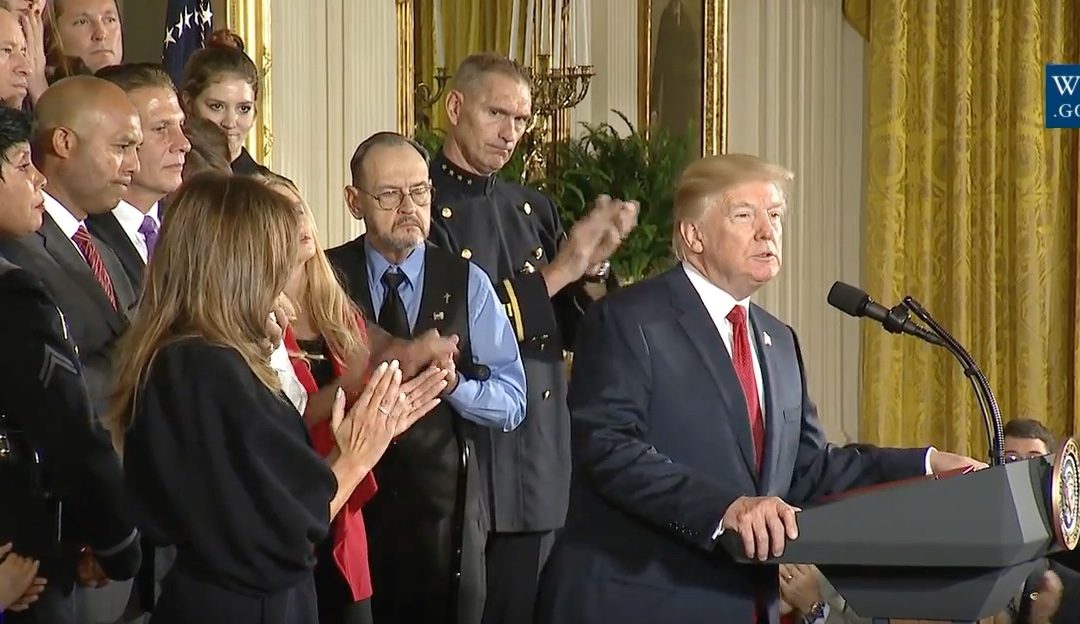The United States’ rates of drug use, abuse and addiction have become a “national public health emergency” that the country can overcome with the combined efforts of more Americans who are determined to prevent and end the scourge, President Donald J. Trump announced today.
Speaking at the White House with First Lady Melania Trump, the president put the country’s addiction epidemic — specifically as it relates to the misuse of opioids — into perspective and outlined some specific steps his administration will take in coming weeks and months to address it.
- Drug overdoses are now the leading cause of death for Americans under age 50.
- The rate of drug deaths is increasing faster than ever. The first governmental account of U.S. drug deaths shows roughly 64,000 people died from drug overdoses in 2016 — a spike of more than 22 percent over 2015. Evidence strongly suggests the problem will worsen this year.
- Almost 1 million Americans used heroin last year, and 11 million Americans abused opioids.
- The United States leads the world in opiate abuse.
Trump administration plans to address U.S. drug addiction
Though he called the country’s addiction epidemic a “national public health emergency,” the President stopped short of announcing new federal spending to address it. However, drug policy experts were quick to note decisions regarding new funding could follow a report expected next week from President Trump’s appointed Commission on Combating Drug Addiction and the Opioid Crisis. The panel of experts charged with issuing the report, chaired by New Jersey Gov. Chris Christie and including Harvard professor Bertha Madras and former U.S. Rep. Patrick J. Kennedy, will detail the nature and scope of the country’s drug epidemic and make recommendations about how to combat it. After reviewing and evaluating the commission’s findings, the president said he would “move to implement appropriate recommendations.”
However, based on preliminary findings the commission already has announced and federal reports from the White House Office of National Drug Control Policy and National Institutes of Health, President Trump announced that his administration already is taking action. Among those measures:
- Increased emphasis on drug prevention — especially for youth. The President — who said he never consumed alcohol and tobacco because of the warnings of his older brother brother, who struggled with addiction — called for bigger, bolder prevention education and messaging. “We will get people — especially children — not to want to take drugs in the first place,” he said. “Watch what happens if we do our jobs, how the number of drug users and the addiction will start to tumble downward over a period of years. It will be a beautiful thing to see.”
- Changes in restrictive and outdated rules to allow states to provide addiction treatment in more facilities. The goal will be to “unlock treatments for more people in need,” the president said. “The approvals will come very, very quickly.”
- Federally employed prescribers of opiates will be required to receive specialized, professional training.
- New Food and Drug Administration requirements that drug companies provide more training to prescribers.
- Public calls for companies and prescribers to limit opiate distribution to seven-day supplies.
- Immediate removal from the market of certain ultra-high-dosage opioid pills, tablets and nasal sprays.
- Increased inspection of packages by the U.S. Postal Service and the Department of Homeland Security. President Trump noted that China, Mexico and other countries “south of the border” are significant drivers of the illicit drug market.
- More aggressive development of nonaddictive treatments for pain. “I will be pushing the concept of nonaddictive painkillers very, very hard,” the President said, adding that NIH Director Francis Collins is already at work on assembling public-private partnerships with pharmaceutical companies to begin this new-drug development.
- Increased resources for medical professionals and first responders — such as Narcan, which has successfully prevented opiate-overdose deaths.
From DrThurstone.com: Opiates and the opioid epidemic
From the President’s Commission on Combating Drug Addiction and the Opioid Crisis:



We welcome all thoughtful comments, but please abide by our commenting rules